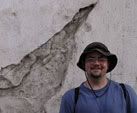
DATELINE: Saturday, April 2, 2005
So there we were, sleeping away, safe in the knowledge we didn’t have to get up `til breakfast time and that our flight didn’t leave until 1:45 that afternoon.
At 5:45 a.m. our hotel phone rang. It was Butch. He and Andrew had gotten up to see Flo off and while they were at it Butch had rechecked everyone’s flight information. It turned out that only his flight left at 1:45 p.m. Everyone else’s left at 8:45, same as Flo’s. We had 15 minutes to pack all our stuff and be downstairs ready to go before Sylvana arrived with the van. He said he would call Tito and Jo Ann so they could bring us our empty luggage.
“Who was that?” Ashley asked as I put the phone down. I told her it was Butch and informed her of our predicament and deadline.
“You’re kidding me, right?” she said.
“Nope.”
To say that we were panicked by this news is putting it lightly. Neither of us had done any packing whatsoever the previous night and all our stuff was scattered. So there we were, neither of us even technically awake, running around the room grabbing clothing and possessions at random and hurling it all into bags unfolded. I’d been optimistic that we could get it all done in 15 minutes, but the whole still being mostly asleep part and the still being very fatigued from our week really put the crimp on that. It was like we couldn’t figure out what we were supposed to be doing next. And in addition to clothing, we had to pack up our fragile items too. Ash had four pieces of pottery and I had all the little clay sun-faces and several bags of chips to worry about. We decided to put it all in our carryon luggage, which we could at least be sure we would have on our persons and could be responsible for not breaking. We certainly didn’t trust the airlines to extend to us the same courtesy.
Through the haze of morning, it occurred to me that this might be a practical joke on the part of Butch. I didn’t know how revenge-minded he was, but a prank of this magnitude would sufficiently get us back for all that stuff we did to him while he was sleeping last week. I could just see us breaking our butts packing and rushing downstairs only to find Butch there waiting with his camera to take our picture, laughing away at us. Ooh, that would be mean. We’d deserve it, but it would be mean. At that point, though, I figured having it be a prank was preferable to having to do a mad rush to the airport with Sylvana driving. She drove crazy enough when we weren’t under the gun, so I was not looking forward to the ride when we were.
After 10 minutes had passed, Butch called us back to tell us we could have until 6:15 to be downstairs. This was actually very good news, because we were nowhere near finished with packing. Unfortunately, it meant that this was not likely a prank after all. And it wasn’t.
Perhaps ironically, the last time Ashley had been in Central America, she'd had to flee the country as fast as she could and here it looked like we were about to have to do the same all over again.
We got downstairs at 6:10. Jo Ann, Tito and Sylvana were there, ready to go, our luggage all packed in the back of Tito’s truck. We loaded up and hit the road.
Fortunately, traffic in San Salvador isn’t very hectic at 6:15 on a Saturday morning. We were able to zip right along at a nice clip and made the 40 minute journey to the airport in seemingly record time.
San Salvador’s airport a very nice, but also very small for the amount of passengers it sees. Even at 7a, it was extraordinarily crowded, and that was just outside. Once again, my airport fears set in and I became very paranoid about our luggage. I didn’t know if it was justified or not, but we’d not had any time for a San Sal airport expectations briefing. I’d have to just be paranoid and wing it.
We unloaded all the luggage from the truck outside the airport. Though most of it was empty, it was still an awful lot of luggage to be lugging around. Butch gave us money for the $32 exit fee we would have to pay and then Jo Ann and Sylvana helped us get everything inside while Tito stood guard at the car. The inside was even more crowded than the outside, with thick queues of people as far as the eye could see. We said our goodbyes to everyone and said we’d hope to see each other in a year. Then Dr. Allen, Mary Ann, Andrew, Flo, Ashley and I headed on in to our place in line.
Oddly, the huge lines didn’t seem to really hamper us much as far as getting through customs went. I paid the exit fee and was given receipts for all of us that we’d have to show at further gates. We then checked our luggage and proceeded to the next set of lines we’d have to stand in. With all the bustling of the crowd, we managed to get separated, which wasn’t a problem until it came time to show the receipts for our exit fees at the next set of doors. After that it was just a brief stop at the metal detectors, a quick x-ray of shoes and carryon luggage and we then found ourselves in the far less crowded airport terminal area. This was a very long hallway that lead to all the boarding stations for all planes. Ours was pretty far down the hall, but we had a half hour to kill, so we weren’t in any great hurry.
We said our goodbyes to Flo, who was headed out on a separate flight to Honduras, and then ate breakfast at a small airport café where they served pastries and coffee.
Even with the big journey ahead of us, I was feeling surprisingly calm about it all. It’s I knew that the worries of the world and the hustle and bustle didn’t really amount to anything and it would all work out okay. Why get worked up about it? I mentioned this to my traveling companions and they felt the same way.
Once aboard the plane, I put on my seatbelt as instructed. It was the first time a safety belt had graced my lap in two weeks.
We could definitely tell we were back in the United States when we landed in Houston. It seemed like everyone we encountered was determined to be rude to us and the customs process suddenly became far more complex than it had been in Central America.
Our passports and customs forms were checked repeatedly at every step and there a lot more walking to be done and many more long lines to stand in. Most of the customs people were cranky too, yet we remained strangely calm.
We went through the X-Ray machines and Dr. Allen’s odoscope turned up in the shot and he was pulled out of line so that all of his luggage could be inspected by hand. Never mind that four members of our five member party all had odoscopes in their bags too, his was the one to get flagged.
Once we arrived at our departure gate, everything was fine. Then the little sign that said “Charlotte” disappeared and one that said “Philadelphia” appeared in its place. Our gate had been moved. Most people would have been annoyed at this, but we just looked around and found the new one across the way and moved. No biggie.
While we waited at our gate, a stewardess for Continental Airlines came by and gave us each claim tickets for our carryon luggage. This was going to be another smaller plane, like the one we’d flown to Houston in from Charlotte, so there wouldn’t be space in the cabin for everyone’s carryon bags. We took the forms, left our bags on the jetway and didn’t think much about it.
We boarded at 1:20 for our 1:35 flight. Dr. Allen and Mary Ann had seats together as did Ashley and I. And Andrew was just across the aisle from us with a good view of the baggage handlers as they loaded everyone’s carryon luggage into the plane’s hold.
“Hey, that guy’s dropping bags!” Andrew said. We couldn’t see what was going on, but Andrew could and said the handler was just yanking bags off the jetway and letting them fall six feet to the ground. He held onto them as they fell to give them a guiding hand, but fall they did and seemed to be landing pretty hard. This was probably the first time we began to get really riled up for most of the trip. The whole point of putting fragile items in the carryons was so THIS wouldn’t happen and here it was anyway.
We called the plane’s steward over and told him what was going on. He said he’d file a report about it and that shut us up for the moment. Our nerves calmed again and we settled in. Soon they plane taxied out onto the runway to await clearance to take off.
And we waited.
And we waited.
And we waited.
At 1:40, the captain came on the speaker and told us that Charlotte was closed due to weather concerns and we’re going to have to wait 50 minutes before they know if we’ll be able to take off.
At this point, the passengers around us suddenly freaked out like it was the end of the world. People began grumbling, loudly and seemed to be of a mindset that asking us to wait for 50 whole minutes might just be the death of us. Our party remains calm.
Somewhere near the front of the plane, a baby began screaming. Not crying, mind you, but screaming full-out, lungs ablaze, hardly stopping to breath. The air in the cabin, which had been warm from all the people aboard, now feels hot. Our party remains calm.
Two seats behind us, a man with a gruff British accent began loudly using his cell phone to call someone in Charlotte named Bonnie to tell her he would be coming in late. We know her name was Bonnie because he said it 20,000 times. His connection wasn’t very clear, so he just kept saying her name over and over and over, then, getting no response, he’d hang up and dial again and begin the process anew. Finally, after minutes of just going, “Bonnie?! Bonnie?! Bonnie?! Bonnie?!” he managed to get a good connection with her.
“Bonnie?!… Bonnie, I can’t hear you…. I said, I CAN’T HEAR YOU!!… I hear loud voices in the background… Bonnie?! Where are you at, Bonnie? Are you having trouble answering your phone, Bonnie?! I hear loud voices there… I said, I HEAR LOUD VOICES THERE!… Can you go to some place where it isn’t so loud?!!” This is what we all were hoping for by that point. Evidently she moved and he began asking her what the weather was like there, to which he didn’t seem to get a satisfactory response because he began chastising her for not paying attention to the weather reports. If he’d shut up for five seconds, he might have heard the three other people around us phone home to Charlotte to learn that the weather was very windy.
Regardless of Bonnie’s bellowing husband, we the mission party were still very calm about it all. Even Andrew, who had the most to lose since Charlotte was not his final destination and he had to make a connecting flight from there to D.C., didn’t seem at all put out by the delay.
We waited on the runway for 50 minutes, with the screaming baby and the screaming Mr. Bonnie going full blast.
At 2:30, the flight crew came on the speakers and announced that we still didn’t know our take off time, but were going to head back to the terminal anyway because a passenger needed to get off the plane. I assumed the guy was maybe just connecting in Charlotte too and wanted to get off and try and catch a more direct flight to his destination. So they fired up the engine and we taxied back within walking distance of one of the airport terminals, but they didn’t let us off. Instead, we just sat there waiting, as the flight crew explained, for a bus to come and drive us to the terminal. And we waited. And waited. And waited.
After at least 10 minutes, the steward came back on the speaker and said, “Ladies and gentlemen, we were taxiing to a gate to allow a passenger off who was sick. But now the passenger doesn’t want off, so I’m not sure what we’re doing here.”
We all laughed at that. I had to hand it to the flight crew for having personality. Shortly after this, they came back on and announced that we had received word from Charlotte and would be taking off at 22 past the hour. Since it was now around 2:50, both we and the captain had assumed Charlotte meant 3:22. Uh, no. It turns out they meant 4:22, a fact that wasn’t learned until we’d waited ten more minutes. The captain had to come on and break the news to us that it would be another hour and 20 minutes before we could leave. He said that it was up to us if we still wanted to deplane and go back to the terminal.
“If you want to deplane, we’ll call some more busses and they’ll probably take another hour,” he then said.
The passengers voted to deplane. This time the busses came fairly fast and we were whisked the 100 grueling yards to the terminal. Once there, we were told we would only have 15 minutes in the terminal before we had to bus up and head back to the plane, so we needed to be sure to stay near the announcement system speakers so we would know when to get back on the busses.
So we sat around in the terminal for 15 minutes. Far from being annoyed, I think most of our party found the whole thing pretty funny by this point. We found it even more funny when we bussed back to the plane and it was discovered that Mr. Bonnie was no longer aboard. The steward walked to the man’s seat and asked if anyone knew who the man was and where he was. This query was answered by a chorus of other passengers saying, “Bonnie? Bonnie?”
The captain gives Mr. Bonnie 2 minutes to appear, then shut the door to the plane. Ten minutes later, Mr. Bonnie came running across the tarmack and they let him in. He returned to his seat, quite shame faced.
At 4:22, we took off.
Our flight home was beautiful with an amazing view of the sun as it set in the West.
Our arrival in Charlotte was indeed accompanied by some bumpy weather, though. It was pretty windy then, so if it had been windier earlier I’m glad they kept us on the ground for as long as they did. I don’t take too well to having my plane tossed around in the air. The pilots got us down just fine, though.
We went through our carryon bags once they were returned to us at the jetway. Nothing seemed to be broken at first glance, but when we went back through them the following day we did find that part of Ash’s clay cooking set had been broken and a couple of the clay sun-faces I had were chipped. We also learned from the Continental Airlines website that their basic policy on this is that even if it IS their fault it’s not their fault, they take no responsibility and they won’t be reimbursing anyone for any items that they damaged. Thanks Continental.
By the time of our arrival, Andrew had indeed missed his flight. But he was able to make arrangements to pick up a flight the following morning and could come stay with us at Ma & Pa’s back in Hildebran and drive over in the morning.
In a reverse of our first day at the airport, we shuttle bussed with our luggage back to Dr. Allen’s truck. I was even wearing the same clothes, and pulled my hoodie/pillow out of my bag to keep me warm against the North Carolina chill. I had hoped the bus driver who’d marveled at all the bags we had two weeks ago would be our driver, but it wasn’t him.
We were all quite hungry, by then, so we stopped off at a Ryans buffet in Gastonia on the way home, where I had a great deal of difficulty not saying “gracias” to our waitress whenever she refilled my tea. It was fantastic food, but I ate far too much of it—stuffed myself stupid, really—and then was embarrassed that I’d eaten so much when I’d just returned from a place where people often have so little. I was miserable in mind and body for the rest of the evening.
Arriving home at Ma & Pa’s house was bittersweet. On the one hand, I was glad it still was Ma AND Pa’s house because Pa had lived through his fall from the roof of the cabin he’s building nearby. On the other hand, it was tough for Ashley to see her father sitting there encased in neck and wrist braces. Seeing him like that reminded her that we’d nearly lost him. She put on a good show when in his presence, but that night was a fairly sleepless one for her.
Pa was doing well. He was still on some pretty serious pain medication, but his wrist was already doing better than expected. He knew then that his recovery was going to be a long one, but his determination to get back up and running and his perseverance at physical therapy have gone a long way toward making that recovery faster. We didn’t know it then, but Pa would remain in the neck brace until mid-June, but his wrist has made a far better recovery than his doctors ever thought. It may never be 100 percent again, but it won’t be because Pa didn’t try to get it there.
We sat in the living room that night, with Dr. Allen, Mary Ann and Andrew, telling Ma & Pa some of the highlights of our trip. It was very hard to do, because at that point everything we’d experienced felt far too big to even know where to begin. You can’t encapsulate an experience like that in an evening (or even in a blog over the course of several months—believe me, I tried and it just hasn’t worked to my liking).
As we were to learn over the coming days, most of the time you don’t even have an evening’s worth of time to spare to tell folks about your journey; instead you have to give people who ask about it a quick snapshot in just a few minutes. Ashley’s method was to simply explain that we saw over 2600 patients in two countries and over 850 of them were lead to Christ. That seems to work pretty well.
DATELINE: Friday, April 1, 2005
Our final clinic day wasn’t originally supposed to occur on Friday at all. Our original schedule called for us to have Friday off entirely so we could go out and see the sights in San Salvador. However, since we didn’t arrive in the country until Monday, which nixed the planned Monday clinic, and since we still had plenty of meds in the pharmacy, we decided to go ahead and do a clinic on Friday. Tito and Jo Ann suggested we do a half-day clinic so that we could still have time for some sight-seeing, so we agreed to do that.
On the way to the clinic, Butch asked Flo if she would be comfortable giving her testimony to the crowd of patients that morning. Flo didn’t seem sure if she wanted to do this at first, and I could feel Butch’s eyes scanning the rest of us for any takers already. The trouble was, I could have given my testimony, but it’s not exactly an awe-inspiring one. It’s pretty run of the mill, in fact.
I first became interested in Christianity at a very early age. Though I grew up Baptist, my father was something of a religious free-spirit (well, a religious free-spirit with pretty firmly held views as to how things work) who wasn't afraid to try out the services of different denominations or even altogether different faiths. I’ve been to Greek Orthodox services, Synagogues, Catholic Mass, Mennonite services, Holy Rolling Speakin’ in Tongues services, plus just about any variation on Protestant services you’d care to name. At the time I hated it, because there we’d be, driving across country when suddenly dad would get it in his head that we had to go be Quakers for the evening, and off my sister and I would be whisked to some strange little church where they didn’t do things like we were used to. Now, I really like that I’ve had all those experiences and have thanked my dad for taking me there.
Even with that background, it wasn’t until the age of 8 that things first started to solidify in my head. I wound up attending a three day church camp based at a local community college near the Mississippi town in which I grew up. This was my first time being away from home by myself, so it was kind of a big step for me. But my best friend Scott Long was there, so that’s where I wanted to be.
In addition to all the usual fun camp-activities, (including a talent show at which I came in 2nd and Scott came in 1st), we were also given Bible lessons throughout the day as well as hearing kid-tailored sermons from our camp minister. We also memorized Bible verses. The first of the two main ones I remember was, of course, John 3:16, “For God so loved the world that he gave his only begotten son that whosoever believeth in him shall not perish but have everlasting life.” This is perhaps the greatest verse in the whole Bible, for it contains the key to salvation. It’s got the whole Wages of Sin is Death thing built in, but it shows you the way out at the same time. But the real Rosetta Stone for John 3:16, for me, at least, was the other verse I remember. It was Romans 3:23, “For all have sinned and fall short of the glory of God.” The camp minister explained that this meant that human beings are born sinners and there’s not a one of us who can live up to the commandments and laws God laid down in the Old Testament. (You know, all those rules and regs that the Jews of the day spent much of their time sacrificing things to gain forgiveness for breaking.) This was why Jesus sacrifice on the cross was so necessary. He, an innocent man, died a horrible death, the death of a criminal/sinner, so that we would not have to face the punishment of hell due to our sinful nature.
Hearing that verse and having its meaning explained to me was a profound moment for me. I can still see the inside of that meeting hall on that community college campus like a snapshot in my head of the moment the meaning hit me. The verse means, we’re all sinners, humanity as a whole with me included. No one is exempt, cause that’s the definition of ALL. Suddenly this nebulous concept of all these nameless sinners getting sent to hell for sinning, that everyone had been talking about, hit close to home. I realized, perhaps for the first time, that I too was a sinner. Sure, I wasn’t sinning big time or anything—I mean, I hadn’t knocked over a liquor store or killed anybody—but I couldn’t say I was even living up to the rest of the 10 Commandments to the best of my ability, let alone the myriad of other things a person could chose to do (or not do) that constituted sin. (Sin, after all, is defined best as disobedience to God.)
Ah, but then my little mind headed back to John 3:16 territory, particularly the bit about “whosoever believeth in him shall not perish but have everlasting life.” Hey, there ya go! I believed in God, I believed in Jesus, so therefore in my mind, I was saved. It was an amazing thing. I felt all tingly inside at the thought of it and figured that’s what happened to a person when they got saved—they felt all tingly.
I came home from camp and announced to my dad that I was saved.
“You are?” he asked, a bit hesitantly. So I told him about Romans 3:23 and my realization over its meaning and its correlation to John 3:16. I didn’t use words like realization and correlation, but you get the gist. Dad listened and then told me that my revelations on those verses were good, but he didn’t think I’d quite hit the mark. I wasn’t saved yet.
Dad let me stew on that one for a while and stew I did.
Within a day or two, though, it began to really bother me. How could I not be saved? I’d felt all tingly and everything, like something had changed within me. Then, in true Michael Binkley style, (that’s a Bloom County reference, folks—pay attention), I woke my dad up in the middle of the night and asked him how I could become a Christian. Dad groggily realized I was serious and he woke up enough to explain a few basics to me.
Dad told me that the way to become a Christian is that first you must admit to God that you are a sinner. It’s not enough just to realize that you’re a sinner, you must actually admit it to God. You must also ask him to forgive you of those sins. Next you must acknowledge that you believe Jesus was God’s son and that he died on the cross in our place as the ultimate sacrifice so that we didn’t have to endure the punishment of hell. And finally you must ask Jesus to grant you his Salvation and accept you into his eternal kingdom. With Dad’s help, I prayed that prayer.
This is not to say it’s been all smooth sailing since. Not by a stretch. And it wasn’t the last time I would pray that prayer. See, as a child I was always a worrier. After I’d been particularly bad, I used to spend a lot of time fretting that somehow I’d said the salvation prayer wrong the first time and wasn’t really a Christian. No one wants to go to hell on a technicality, so I prayed it again and again over the years. My father finally pointed out to me that most people who aren’t Christians don’t worry over their salvation or lack thereof so much and it’s usually the people who are already Christians that spend so much time worrying about their sinfulness and seeking redemption. Made sense.
I also have to admit to falling by the wayside with my faith quite a bit over my life. I felt pretty strong in it when I was a kid all the way up through high school. I had my ups and downs, but I felt like I was on the path. During college, my ups and downs became more frequent, but I had good friends who were Christians who helped keep me on the path most of the time. After college, though, I spent several years away from church, not out of any philosophical differences but mostly because I was unwilling to upset my comfortable life by actually getting off my duff and going there only to be reminded of how much I was disobeying God in the first place.
These days, thanks in large part to my wife’s influence, I’m a pretty regular church-goer. Not that that in and of itself means anything, because I’m probably just as big a sinner as I was before in many regards. But I have a good church and good friends in it who go a long way toward helping me stick to the path and grow in my relationship with God. And that is the ultimate goal that many people miss. There’s a common misconception that Christianity is all about Do’s and Don’ts, but at its core Christianity is supposed to be about an ongoing relationship between you and Jesus, one where you allow him to steer your life where He would have it go and you’re just along for the ride, putting your faith in him that He will bring you through the experience. I’m thankful to say that I’ve had quite a few Step out on Faith moments in my life, this trip being a big one of them. God has always brought me through.
So my testimony is pretty normal. Not that it would have been a bad one to give, being as how the vast majority of people who become Christians probably have fairly normal testimonies to give. As it stood, though, I didn’t have to give mine. Flo went ahead and gave hers that morning and I was left wondering what I might have said.
Only 65 patient numbers were given out Friday morning, but we let some more in after we saw that there were some people truly in need who arrived too late to get numbers. One lady who arrived late complained to us that she had not heard our clinic was even in the area until that very morning. We wound up seeing her anyway.
I know this number system for seeing patients seems cold and clinical, but it’s almost the only way to run things. Dr. Allen remarked through both weeks of this mission that he had never seen such smooth and seemingly practiced organization outside of mission work. Such things certainly don’t happen so spontaneously back in the states. We knew, though, that this was not practiced because this was indeed the Word of Life El Salvador Team’s fist such medical mission.
Because we had so many meds left, much of it in vitamin form, all prescriptions Friday got vitamins whether they wanted them or not and usually a two month supply. We also discovered that we still had loads and loads of candy, so I began bagging up fistfuls of it into our ziplock prescription bags and kept it in a box by the pharmacy window to dispense to any children who happened by with their parents.
In the morning, I spied a little girl out front who didn’t seem to be having such a great time, so I went out with a bottle of bubble stuff and blew bubbles for her to demonstrate how it was done, then gave her the bottle. She smiled and began blowing bubbles and soon had friends gathered round. A few minutes later, I looked out again to see one of her older friends running around with the girl’s bubble stuff. At first I was mad that this older girl might have taken the bubble stuff away from the younger one. Then I figured out that they were all just sharing. I grabbed a couple more bottles and went out to give to the girl and some of the other kids out there. Soon bubbles were floating freely throughout the clinic.
Not too long later, I had a little more time off and went out to juggle for the kids. I’d been saving my juggling balls for most of the trip and had brought quite a few. Most of them were from my personal juggling materials collection, many of them just rubber balls and raquet balls, the very ones I’d used when I first learned to juggle. I don’t use them anymore, preferring to use juggling bags when I juggle at all, so I figured relocating these to Central America would be a good thing. After I’d juggled two balls with one hand and three balls with two hands for a bit, I threw the balls to the three nearest kids and nodded that they should keep them. (You can communicate so much with a nod, at least in my mind.) They dashed off to play with their new toys. Soon after I returned to work, I began to notice children gathered at the pharmacy door. Word had spread I was giving out toys and the kids were looking awfully hopeful. After letting them stare in at me for a while, I did another juggling routine and then passed the balls out to the gathered kids. They disappeared and were replaced with new kids. So then I gave out the remaining balls I had and more kids arrived. Then I gave away all the rest of the bubble stuff and more kids arrived. Finally, I handed out some of our prescription bags full of candy to the remaining kids and that seemed to do the trick. They grinned and dashed away.
In addition to giving out extra meds for diagnosed problems, the docs on Friday also began prescribing some placebo meds as well.
Placebos, for those who don't know, are medicines or harmless substitutes for medicines given to patients in place of real medicines. These days, they're mostly used for control groups in pharmaceutical testing labs, but in the old days doctors prescribed placebos all the time when they suspected a patient's ailment was mostly in their head.
In our clinic, we weren't exactly using them in either manner, but instead used them in cases where we could not medically treat the symptoms described. I’ve said it before here, but it stands repeating: Doctors can attest that medicine is often more art than science. If a patient can be sold on the idea that something is going to make them better or will cause a condition to stop, they will very often get better or the condition will stop.
Dr. Allen said that this sort of practice used to happen all the time in doctor's offices across the U.S. And pharmacists, back in the day, were used to seeing prescriptions for a veritable wonder drug called Obecalp, (that's placebo spelled backwards), that was used to treat a huge variety of conditions. However, in the intervening years, medicine has become a whole lot more regulated, so these days doctors in the states pretty much have to put up with their hypochondriac patients.
The placebo meds we gave out were genuine meds, like Benadryl and Chlortrimeton, but they were prescribed for conditions they were not intended to treat. Throughout the morning, we in the pharmacy would get prescriptions for Benadryl and beside the drug-name on the prescription would be a little note from Dr. Allen explaining what condition this drug was being prescribed for, so if a patient asked if it was for his nerves or for his insomnia we could say, “Yes, that’s what it’s being prescribed for.”
While dispensing meds Friday morning, one of our patients surprised me. Though I had Claudia there as a translator, I gave the lady instructions in Spanish since the instructions were simple.
“Tres diarias. En la manana, en la tarde, en la noche.”
“So, it’s one pill three times per day?” the lady replied in perfect English. I was dumbstruck at first, then grinned at the patient.
"You speak English," I said.
"Yes," she said.
So I explained the rest of her prescriptions in English and finished up with “God be with you” instead of my usual “Dios te bendiga.”
Claudia asked me about my Spanish skills. I had to admit that to call them skills was really pushing the definition of the word. Sure, I’d taken over six semesters of it in college, but technically what I’d really done is take 6 semesters of a 4 semester course. I took Spanish I, enjoyed it, did fairly well in it, and then promptly sat out of it for an entire year before taking Spanish II. Naturally, I had forgotten so much of my knowledge from Spanish I that I began failing II miserably and had to drop it. So I came back for round 2 the next semester, having not so much as cracked my Spanish I book for a brush up, and proceeded to fail the class yet again and was forced to drop it. After this, I decided to audit Spanish I and really do the refresher course right. That helped tremendously and I proceeded through Spanish II, III and IV. I can't say I got through them with no troubles, but I got through them.
I found, however, that throughout my two weeks in Central America, much of my Spanish skills had returned to me, far more than I had expected. Verb forms that I’d forgotten were reconnecting in my head and little bits of things would filter out every now and then.
“Hey, I remember Tener!” I said, just after a patient asked me if I was the guy who had the patient numbers. I didn’t know what to tell her so I directed her to someone else. Then I realized, I could have just said, “No tengo numeros” or "I have no numbers" and answered her question.
Toward the end of our clinic day, some kids from the neighborhood came up and asked if we were seeing any more patients. The missionary staff member whose job it had been to give out numbers explained that we weren’t and that we were sorry. The kids left. On their way down the street, they happened to pass by Butch, who was coming back from the store with more goodies. He noticed that one of the kids was barefooted and limping and was bleeding from his toe. Butch got the kid’s attention and helped him back to the clinic where he was put right into the system. Turned out his injured toe was in pretty bad shape and in danger of going septic on him. It was providence that Butch happened by at that moment and noticed it. Kid would have been bad off otherwise.
At 1:30 p we saw our last patient, filled our last prescription and then went next door to our final clinic lunch. I savored the home made potato chips one last time. We all feasted and had extra sandwiches afterwards and enjoyed the company.
After lunch, we packed up the clinic. Even giving out as much extra meds as we had earlier, the pharmacy still had quite a lot of medication left over. We packed as much of it into the plastic tubs as we could and the rest into the remaining suitcases. We would be leaving it in the care of Tito and Jo Ann for use with future missions or to distribute to those in need as they saw fit.
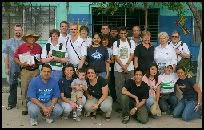 When the clinic was packed away, Butch wanted to get a group photo with everyone. Unfortunately, he chose to take this photo beneath the cicada tree. He asked Dr. Allen and I to take up positions as the end markers for the photo and then once we were positioned he asked everyone else to file in between us. There we stood, beneath the cicada tree while Butch got us into position, the cicada urine literally raining down upon our heads. It was so very very foul. Fortunately, I remembered that Ashley had made me pack a disposable plastic rain poncho, so I pulled it out of my backpack and put it on. After much jostling, we were finally in place and Butch snapped several photos before we revolted and dashed out from under the tree.
When the clinic was packed away, Butch wanted to get a group photo with everyone. Unfortunately, he chose to take this photo beneath the cicada tree. He asked Dr. Allen and I to take up positions as the end markers for the photo and then once we were positioned he asked everyone else to file in between us. There we stood, beneath the cicada tree while Butch got us into position, the cicada urine literally raining down upon our heads. It was so very very foul. Fortunately, I remembered that Ashley had made me pack a disposable plastic rain poncho, so I pulled it out of my backpack and put it on. After much jostling, we were finally in place and Butch snapped several photos before we revolted and dashed out from under the tree.I will not miss those bugs.
We drove back to the hotel to freshen up and rest a bit before heading out to see the sights of San Salvador. The plan was to souvenir shop for a while, then go out to dinner with much of the mission staff round 7.
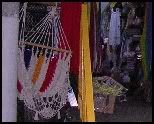 We headed first to an Indian Market to shop for souvenirs. There were enough translators to go around, but mostly the shopkeepers were used to dealing with Americans so it wasn’t always a necessity. I found some really nice gifts to take back home for very low prices. Once again the American dollar goes a long way, and where it didn’t there was always the opportunity to haggle. Ashley found some really nice pottery, including a colorful chip dish with salsa bowl and a clayware set that included a large urn in which you could put a Sterno to cook through a smaller pot that rested on top. It was sort of like a fondue pot, without the long forks.
We headed first to an Indian Market to shop for souvenirs. There were enough translators to go around, but mostly the shopkeepers were used to dealing with Americans so it wasn’t always a necessity. I found some really nice gifts to take back home for very low prices. Once again the American dollar goes a long way, and where it didn’t there was always the opportunity to haggle. Ashley found some really nice pottery, including a colorful chip dish with salsa bowl and a clayware set that included a large urn in which you could put a Sterno to cook through a smaller pot that rested on top. It was sort of like a fondue pot, without the long forks.After shopping there, we still had a bit of time before our reservations at the restaurant, so Jo Ann and Sylvana took us to a very swanky supermarket. I had mentioned to Jo Ann that I wanted to visit a supermarket at some point because I was looking to buy some instant soup for my boss. My boss’s sister-in-law is Guatemalan and she introduced my boss to a Knor-brand instant soup from Guatemala that was terribly delicious. My boss wanted me to score some if I could. I never got the chance to grocery shop in Guatemala, though, but figured El Salvador would probably have the same sorts of things. Meanwhile, Ashley wanted to shop for some fried plantains and Fresca. So we all followed Jo Ann to a grocery store located in a high-end strip-mall full of expensive shops. Our translators told us as we arrived that this was where the wealthy people of San Salvador came to shop. True enough, the place was surrounded by a very Yuppie-like crowd, out for their Friday evening.
Once inside, we located the soup aisle, but while they had plenty of Knor soups, they didn’t have the particular flavor I was looking for. I loaded up on them all the same since they were only a quarter each. We also found some individual bags of fried plantains to take back with us to give as souvenirs as well as some El Salvadorian coffee and Fresca.
While we were still browsing the chip aisle, one of the missionaries, Nestor, looked down into our basket and said, “You are buying whiskey?”
“No, no,” Ashley said, thinking he was joking around. “We’re only buying soup and chips.”
Nestor pointed into our basket again, where there indeed was a bottle of tequila in the bottom.
“I’ve been framed!” I said, looking around to see if the culprit was near. Not that I eschew alcohol by any means. I’m not a Christian who believes that merely drinking alcohol is a sin, and I believe Jesus drank enough wine during his time on earth to prove my point. However, even with that in mind, we weren’t really looking to buy any then. It took some time and guesswork to figure out who stashed the tequila. Naturally, Butch was our number one suspect and he seemed happy to take the blame. Too happy. In the end, I think it was Flo who figured out that it was really Sylvana who had stashed the booze in our basket. When confronted, Sylvana laughed and laughed.
We were to get another shock when we went to pay for our purchases. After the cashier rang up everything, the total price according to the register screen, was like 170.50. Fortunately, Nestor was there to aid us in translation and explained that the 170.50 was in the old El Salvadorian currency, back before the economy switched to American dollars, so we really owed around $15.
Next we climbed back into Sylvana’s van and rode to the restaurant of our dinner reservation at the Hunan Chinese Restaurant. (I know, I know, we came all the way to El Salvador to eat Chinese food. Shut up.) Sylvana, of course, was driving like a mad woman and that extended itself to parking. The restaurant was in a multi-story office building that we later saw consisted mostly of doctors offices and the like. However, we approached the building from the far two lanes of a very busy four lane road and in order to park we would have to cut across the two lanes of oncoming traffic. Sylvana waited and waited until we had just enough time to squeeze through a gap in the traffic and then she started to gun it before coming to a screeching halt in the middle of the lanes.
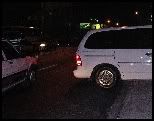 What we didn’t realize until then was that the road itself, through paving and repaving, was now quite a bit higher than the parking area in front of the building. In order to park, the van would have to drive down the rolling dip of the edge of the asphalt and then onto the rise of the concrete sloped parking space. With all eight of us in the van, however, this was an impossibility without gouging out the bottom of the van in the process.
What we didn’t realize until then was that the road itself, through paving and repaving, was now quite a bit higher than the parking area in front of the building. In order to park, the van would have to drive down the rolling dip of the edge of the asphalt and then onto the rise of the concrete sloped parking space. With all eight of us in the van, however, this was an impossibility without gouging out the bottom of the van in the process.“Uh oh,” Sylvana said.
“We have to get out?” Flo asked.
“Yes.”
So there we were, pouring out of the van like a Chinese fire-drill (ironically enough), two lanes of honking cars beaming their headlights at us as we scrambled to get out of the road. Our weight no longer a factor, Sylvana gingerly pulled into the parking space and we were set.
Dinner was fantastic and the restaurant quite nice. In fact, I hadn’t realized it was going to be that nice when I’d dressed for the evening.
“I’m glad I wore my best dirty T-shirt and flip flops,” I told Ashley. I didn't have much of a choice, though. If it wasn't a T-shirt and shorts it would have been the world's wrinkliest dress-shirt and pair of corduroys, since my dressier clothes had spen the past two weeks wadded in my luggage.
Inside, we met up with many other members of the mission staff and were seated around an enormous round table that seated 16 people. Soon we had hot tea and shark fin soup to sample while our choice of dishes was prepared. When the food arrived, they came on big platters that were placed on the giant Lazy Susan in the middle of the table, and we took turns spinning it and sampling from a variety of great food.
After dinner, Jo Ann told us that Tito wanted to say a few words to us.
Though Tito is the leader of the Word of Life mission in El Salvador, we’d heard very little from him all week long. We’d been told in advance that he was a quiet man, but a very good soul and he had proved to be that throughout the week. I think we all assumed when Jo Ann said Tito would like to say a few words to us, that he would say a few words in Spanish and that she would translate them into English for us. However, what happened next surprised us all. Tito began speaking English—very good English. And he spoke in very good English for ten minutes straight. When he was finished, all we could do was grin and congratulate him on having fooled us all week. He’d never said he couldn’t speak English, but we’d all assumed as much from his quiet demeanor.
After dinner, we said our goodbyes to most of the mission staff and headed back to Tito and Jo Ann’s house to deal with the luggage. All of our clinic supplies had been brought back to their home following our day and it was time to divide it up and see how we were getting things back to the states. The meds and remaining toys and candy we left behind for future missions or as Tito and Jo Ann saw fit to distribute. There were a few other sundry supplies and items of donated clothing that we left as well. This left a lot of empty luggage, which we treated like Russian nesting dolls, putting bags within bags within bags to consolidate space. We also made plans for breakfast the following morning. Jo Ann knew of a place that sold an El Salvadoran dish called a pupusa which was supposed to be a great breakfast food. The place also sold genuine fried plantains, which is what I wanted. The only member of our team who wouldn’t be able to go was Flo and this was because she had an early flight out at 8:45 the next morning to go to Honduras, where she would be staying with some friends she had from previous mission trips. She’d have to leave the hotel around 6 a.m.
We left all the empty luggage with Jo Ann and Tito and headed back to the hotel in the van. Ash and I got to sleep around 11:30, savoring the knowledge that we’d get to sleep in a bit in the morning, go have a fabulous breakfast, pack up our stuff and be ready to go by our 1:45 p.m. flight back home.
DATELINE: Thursday, March 31, 2005
Since we didn’t leave the clinic until after 9 and didn’t eat supper until after 10 and didn’t get back to our hotel rooms until nearly 11, we didn’t get much sleep until nearly 12. So when the alarm went off at nearly 7, Ashley and I were in no mood to actually get up. We’d both been worked to a frazzle the day before and had very little sleep in between, so we just could barely face getting up at all. I don’t know how we managed not to growl any more at one another than we did, but we arose and got showered and dressed with very little griping.
None of the rest of the Team Gringo were especially bright or chipper, but I don’t think any of us dreaded the day itself. We just wished we had more energy to give to it. As for me, though, I needed not only more energy but also a better attitude. I was a right cranky Gringo, for no real reason, and it seemed like everything was irritating me. That attitude, unfortunately followed me all the way to the clinic site.
In the Pharmacy, we had a little downtime before patients began showing up so we bagged more and more medicine. We could hardly keep up with the demand for vitamins the day before, so that was a primary goal for pre-bagging. For much of the day, whenever any of us had a spare moment, we bagged vitamins. Unfortunately, it was difficult for any of us to do this without taking up valuable counter space and generally getting in the way. And you could only bag meds for so long before the swell of patients seeking their prescriptions filled called you away to help with the filling, leaving a mess behind from the stuff you were bagging before, clogging the counters and other spaces. I began to get growly—never a good sign.
We also bagged a bunch of other meds, trying to stick to the doc’s new favorite dispensing amount of 30 pills, instead of 20, only this time to have prescription after prescription arrive in amounts of 20!!!
“Porque? Porque? Porque?!!!!”
I also began to become further irritated with my fellow pharmacy staffers, particularly Mary Ann, who kept insisting on doing everything the right way instead of my preferred semi-half-assed way. I can’t even recall the exact details of what I was irritated about, except to say that it was over a medicine, probably Amoxil, that we had to instruct the patients how to pre-mix, but the way I wanted to do it required them to put 2 ml less water into the powered Amoxil than the dose actually called for. I think this was because we’d run out of the syringes that were easy to mark, or maybe we’d run out of our 250 mg Amoxil and were having to recalculate doses from the 400 mg Amoxil we had plenty of. I don’t recall. What I do recall is that Mary Ann insisted, as well she should have, on getting the dose exactly right, instead of having a dose with slightly less water in it, as I was trying. This was probably the pinnacle of my ire for the day, but even as I was fuming inwardly and sometimes outwardly about it, I realized that Mary Ann was only trying to do the right thing for the patient, and that no matter how little the differences in out methods might actually matter, I should defer to her experience in these things, especially considering that I’M NOT A MEDICAL PROFESSIONAL and SHE IS.
After that realization, my attitude became quite a bit better. It often takes embarrassing myself with my own bad-behavior for me to recognize how badly I’m behaving and making the necessary adjustments to stop.
One of the major patient pharmaceutical requests was insect repellant. In a country with the kind of large and aggressive bugs that this one seemed to have, it stood to reason. However, the pharmacy did not stock bug dope of any kind. In some cases, however, there were children patients who had enough bug bits on them that it seemed like some sort of repellant would be good to prescribe. This is when Ashley had the idea of concocting a 1 percent solution of Deet in water. Deet is one of the most powerful insect repellants on the planet. Unfortunately, it is also quite dangerous when it comes to killing off brain cells in children and is not recommended for use with children. Her idea was to create a very weak solution of it to use on the child’s skin to ward off bitey bugs. I let her mix it, so as not to screw it up and put too much in it myself. But I didn’t feel good about it. Most of the meds we had in house wouldn’t kill a person if they took too much. And even though the Deet solution was given out in a child-proof bottle that I’d drawn a skull and crossbones on, I didn’t feel safe that the kid we’d prescribe it for wouldn’t find a way to open it and drink the stuff. Later in the day, Ash prescribed another bottle of the stuff, which I mixed up and labeled, but then went to her and told her that I didn’t feel good about giving such poison out, so we nixed it from the prescription.
We did do some far safer mixing when it came to creative prescriptions. Because we were seeing so many skin rashes, the docs had been prescribing lots of hydrocortisone cream. So much that we ran out of it pretty early in the day. Dr. Allen suggested that we make our own cream solution by mixing 1 part Triamcinilone Cream (a far more powerful skin ointment than Hydrocortisone) with 4 parts hand lotion. We mixed it up in tiny little baggies, labeled it as to what was in it and in what ratio and then gave it out as prescribed. I wound up mixing quite a few of these throughout the day.
Dr. Grace was back with us for most of the day on Thursday, so we kept a pretty steady patient rate.
On Thursday, Ashley had to leave for her first house-call. A woman had come to the clinic and explained that her son had suffered a severe burn to his leg and was unable to walk to the clinic for treatment. So Ashley, Butch and a translator took some supplies and some meds from the pharmacy that would be good for treating burns and headed out by vehicle with the mother to visit her home. Ash told me later that she didn’t know what to expect. For all she knew, the boy had just burned himself horribly that morning and she didn’t have the know how to do much, other than tell his parents they needed to get him to a hospital. Or if the burn had happened some time ago, she would likely have to deal with improper bandaging and infection. She prayed that God would give her insight.
They drove for a couple of miles until they were in a wooded area where they came upon a house. The boy himself was seated on the front porch of the house waiting. The boy was wearing long trousers and didn’t seem to be in any obvious pain. Ashley, through the translator, asked if she could see his burn and he lifted up one of the legs of his trousers, which had been split along the side for easy access. The leg had what looked like a fairly fresh dressing on it. The boy removed the bandages for her to let her see the burn itself. Upon seeing it, Ashley was confused, because she couldn’t figure out why the burn had a crosshatched pattern. It was also not in nearly as bad condition as she was expecting. Then she realized why it had the crosshatched pattern. The boy had received skin grafts on the burn already. This burn had been treated by physicians who had shaved skin from elsewhere on his body and applied it to the burned leg, to help grow new tissue there. The reason for the crosshatched pattern is that skin heals far better from lots of smaller wounds rather than one large wound. So before the shaved skin is applied it is first cut into a latticework-like pattern that facilitates faster healing. Not all of the skin graft had taken, so there were burn patches showing through, but Ashley said the whole thing seemed to be healing fairly well. Since she was there, Ashley applied a burn bandage infused with silver which would help in the healing process.
In the afternoon, we were brought more nifty snacks purchased at a local neighborhood store. Butch returned from the store bearing a large roll of snack bags, the kind chips usually come in. I say they were in a roll and what I mean by this is that instead of individual bags of chips, these bags were still attached to one another, as though they’d missed a key process at the packaging plant in which they were to have been cut apart. At a mere 5 cents American per bag, though, these rolls of chips were actually a pretty neat idea. After all, it’s much easier to transport a long coil of chips than 20 mini bags. Butch had also bought three different varieties so we could each get a good sample of the kind of snack junk-food El Salvador had to offer.
One of the varieties was basically Cheatos. They weren’t called Cheatos, but that’s what they were. And unlike my experience with El Salvadorian Oreos, these Cheatos actually tasted like real Cheatos. In fact, they were almost better than real Cheatos. Almost. couple of different
The next variety were a kind of bacon flavored puffed snack that had a similar texture to Funions. They were quite tasty. We don’t really have an equivalent in this country, so next time you’re in Central America you should pick up a bag of them. Sorry, I don’t recall the brand name.
The last variety was my favorite, though. They were salted and deep fried plantain chips. Yesiree, these were the best of the bunch. They were sweet and salty and crunchy all at the same time. Just Mwah! Goodness! I ate two bags of them without breaking a sweat.
“You know, fried plantains are a breakfast food here,” Jo Ann said. She didn’t mean the fried plantain chips, but actual plantains deep fried and coated with powdered sugar. I suddenly found I had a hankering for just such a creature and was looking forward to ordering them as soon as possible. Jo Ann even told us that she knew of a good place that did fried plantains and that if we wanted to we could go eat there on Saturday. Sounded like a plan to me.
The thing about the chips that continued to amaze me, though, were their price. Five cents American. I just marveled at it. Sure, it’s not like we were getting a Big Grab, or anything, but these bags represented the size you usually find with a child’s lunch. Not a bad size for a quick snack. And you couldn’t beat 5 cents. Jo Ann asked how much one would cost in America.
“Oh, fifty cents, easy,” I said.
They were appalled.
Unlike Guatemala, where the currency is Quetzales, El Salvador now runs on the American dollar. However, as you can see with the example of the chips, the dollar goes a lot further in El Salvador than it does back home.
Thursday afternoon we were joined in the pharmacy by two new translators, whose names were Rosio and Claudia. They were very sweet young ladies who were very good at their job of translating. Some might say too good. Whereas Jo Ann pretty much stuck to our standard prescription instructions of telling each patient how often to take their medicine and for how many days and circling this frequency on our graphic-based instruction slips. Of course, if the instructions were more complicated, she would write them out, but for the most part she kept it as simple as possible. Rosio and Claudia, however, felt it necessary to not only explain all instructions in graphic detail but to write them all down in graphic detail as well. This might not have even been an issue, except that we still had Dr. Grace with us and she continued whipping through patients at an astounding rate. Soon the pharmacy had a line of patients fifteen feet deep and it stayed that way. Mary Ann and I were filling prescriptions as fast as we could, but then these filled prescriptions had to get in an ever-lengthening line to have their instructions notated, which we also had to be present for to make sure they were done right. It was gumming up the works and was beginning to put me into another foul mood. I tried to explain to them that this was not a productive or efficient way to run a pharmacy. Sure, it was very nice that they wanted each patient to know exactly when and how often to take their meds, but this wasn’t rocket science and we had been doing perfectly fine telling patients, “Uno por dia” and “Dos diarias” when the patients were to take pills once or twice a day. Granted, if a prescription was more complicated than that, we had an obligation to explain it and write out the instructions accordingly, but for the vast majority of prescriptions we could just circle the little pictures on the instruction slips. Rosio did not agree with this. Not at all. I don’t know if she didn’t think the people were smart enough to follow the graphs or if she thought they would forget what we told them, but she did not like it that I wanted her to stop writing out all the instructions. I tried to explain that we’d been using the graphs quite successfully for not only this week, but a full week in Guatemala before this and had no known problems. (In her defense, there’s no way for us to gauge whether or not patients had any problems because we couldn’t follow any of the cases up afterwards.) Taking the amount of time we were with each med was slowing everything down to a crawl and causing the patients who had been waiting to be seen for most of the day to have to wait even longer before they could leave. All we needed to do, as I saw it, was fill the prescriptions, circle the right pictures on the instruction slips, explain each slip in regards to each medicine to the patients and then put those slips into the individual med baggies or otherwise attach it to the med bottle itself so that they wouldn’t be confused with other meds.
Rosio didn’t like it, but she and Claudia agreed to do it my way. Of course, the first patient Rosio tried my method on was a kid in his late teens who gave us the blankest of looks when Rosio told him the instructions for his pills. He looked at her like she was speaking English, or something. She told him the instructions again, very simple instructions that he was to take one pill three times per day until they ran out, but again his expression spoke volumes about just how much he didn’t get it.
“Uh, maybe you’re right after all,” I said. After that we kind of met in a middle ground of our two methods, altering it on a case by case basis.
At the end of the day, one of the last patients to be seen was an elderly woman. She explained to Dr. Allen that though she had been waiting for much of the afternoon, there wasn’t actually anything wrong with her. She said she lived nearby and had several children and grandchildren living with her. Due to circumstances, the grandchildren were largely unable to work, so she was the primary bread-winner for the household in her job as a housecleaner. Her family was understandably very poor and had little money to spend on anything fun for the kids. She had been told that our clinic had been giving out toys and candy and she had walked here and signed up to be seen on the off chance that we had some toys and candy we could give to her to take home. Dr. Allen was very touched by her story and loaded her up with toys and candy and vitamins for her whole family.
Our clinics ended around 7 that evening and we were able to head on back to WOL headquarters for a much earlier supper than the night before. Some of the translators from our week would not be returning for our Friday half-clinic, so we had something of a tearful farewell with them Thursday night.
EL SALVADOR CLINIC DAY 3 STATS
Patients Seen: 218
Prescriptions Filled: 586
Salvations/Rededications: 67
DATELINE: Wednesday, March 30, 2005
Breakfast worked better this day. We got toast and jelly and it didn’t even take all that long.
Ash took my list of meds we’d run out of or were otherwise low on and headed to a local pharmacy with Jo Ann and Butch. The rest of us piled into Sylvana’s van and headed back to our pre-school clinic site.
We had nearly reached our clinic and were passing near the new neighborhood clinic site—the one with no staff and no medicine—and were a bit surprised to see a great deal of activity around it. The gates were open and there were many people standing around outside with decorations. In fact, the road past it had been blocked off due to all the new vehicles so we had to take a different route to our clinic. Later, Jo Ann explained to us that this day was the grand opening for the neighborhood clinic and there would be much celebrating going on there throughout the day.
“But they’re not really about to open, right?” I asked.
“No,” Jo Ann said. They still had no staff and no meds and no money for either, so the actual opening day was still months and/or years in the future.
“Huh.”
Despite that, the grand-opening celebration did continue throughout the day. We knew this because we could hear loud music coming from the direction of the other clinic which was broken up only by incredibly loud fireworks that sounded exactly like mortar shells going off. Tremendously loud. I thought for a moment they were indeed firing rounds into the air, because it was that loud. It made for a very trying day, because it seemed like every time I had to measure something into exact amounts done in a delicate fashion, BOOOOM! and I’d nearly spill everything. Fortunately, there was not a lot of blood to be drawn in our clinic, or I could see horrible ramifications of the explosions. This went on throughout the morning and into the afternoon, making us all extremely nervous as we tried to go about our business in what sounded like a war zone. I began to suspect they were doing it on purpose to try and get back at us for inadvertently showing them up at their own job. I mean, how dare we open up a free clinic and treat patients when there was a perfectly good pay-clinic, with balloons, food and fireworks, albeit utterly devoid of doctors and medicine, just down the road?
Meanwhile, we had far more patients to see than the day before. Apparently word had spread of what we were doing. Fortunately, Dr. Grace was still with us, so we passed out extra number tickets that morning so we could see more patients. This would turn out to be a decision with ramifications.
One observation I and other folks on our mission staff made was that the people in this part of El Salvador did not seem to be suffering from the same sort of ailments as those we saw in Guatemala. In Guatemala, there was lots of dehydration, parasite problems and the occasional mother whose baby suffered from a heat rash so she bundled him up in three layers of cloth and was terrified to open the bundle even a crack for fear the infant might catch a chill. In San Salvador, we had no cases of scabies come through and not as many internal parasite cases. I know this because we prescribed no scabies treatment and very few doses of Flagyl. What we did see were a lot more diabetes cases, gastritis, fungal infections and high blood pressure. And we wound up having vitamins prescribed to nearly every patient, child or otherwise.
Once again, the local people are huge believers in the power of vitamins, so Dr. Allen and all the other docs prescribed away, continuing the valid philosophy that if the patient believes they’re getting better they’ll likely get better. We still had plenty of children’s vitamins, but we’d run out of adult vitamins on the first day in San Salvador. To make up for the loss, we—with doctors orders, mind you—began giving out prenatal vitamins to the adults. According to Dr. Allen, it’s basically the exact same stuff as regular adult vitamins, only these came in horse-pill form rather than the tiny little red pill form our regular adult vitamins took. We were thankful that there was a language barrier in this instance, but still tended to mark out the Pre-Natal labeling on the bags.
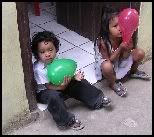 Though we were all terribly busy, I once again began looking to find things to give out to the children we were seeing. Since I’d exhausted my supply of little flashlights in Guatemala, I returned to giving out balloons. I kept a wad of them in my pockets and when traveling between clinic stations to ask questions, I would often blow one up and give it to a child. However, once again, if I gave a balloon to one single child out on their own, I soon had a cluster of them around the pharmacy door looking up at me with hope in their eyes. This was cool with me, though. Between prescriptions, I blew up balloon after balloon, passing them out to the kids at the door. I had given balloons to a brother and sister, who sat in the doorway across the hall from the pharmacy to play with them. Before long, we heard, POW! as the brother’s balloon popped. Thanks to the fireworks, my spine automatically seized up at the sound and I was sure most of the spines of the people in the clinic room these kids were sitting near probably had too. However, the brother looked very sad at the loss of his balloon, so I blew up another one for him. A few minutes later, though, there was another POW! After that, I decided he’d had his quota of balloons, because my nerves certainly had theirs of small explosions.
Though we were all terribly busy, I once again began looking to find things to give out to the children we were seeing. Since I’d exhausted my supply of little flashlights in Guatemala, I returned to giving out balloons. I kept a wad of them in my pockets and when traveling between clinic stations to ask questions, I would often blow one up and give it to a child. However, once again, if I gave a balloon to one single child out on their own, I soon had a cluster of them around the pharmacy door looking up at me with hope in their eyes. This was cool with me, though. Between prescriptions, I blew up balloon after balloon, passing them out to the kids at the door. I had given balloons to a brother and sister, who sat in the doorway across the hall from the pharmacy to play with them. Before long, we heard, POW! as the brother’s balloon popped. Thanks to the fireworks, my spine automatically seized up at the sound and I was sure most of the spines of the people in the clinic room these kids were sitting near probably had too. However, the brother looked very sad at the loss of his balloon, so I blew up another one for him. A few minutes later, though, there was another POW! After that, I decided he’d had his quota of balloons, because my nerves certainly had theirs of small explosions.There were quite a number of stray dogs in the area. We even began giving them nicknames that seemed to match their appearances. My favorite was Fluffy Dog, who was a pretty little fluffy dog, albeit a bit scraggly from life on the street. None of the dogs seemed mean or dangerous in any way, but just hung around the clinic and the people looking for any stray bits of food that might fall. And food didn’t have to be human food either. I saw hungry dogs gobbling up the cicadas that had been unfortunate enough to fall out of their tree. And at night, the place was a veritable cicada buffet for the dogs.
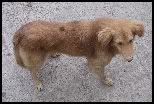 I also noted that most of the dogs wouldn’t respond to me when called. I tried everything I know that usually works on dogs, such as whistling through pursed lips or barking or whining or just calling “Hey dog!” but they ignored me steadfastly. Even when Fluffy Dog wandered into the pharmacy, I could not coax any kind of reaction out of it, even to try and shew it away. Butch pointed out that this was an El Salvadorian dog, so it didn’t speak English. He was joking, but there actually seemed to be some truth to this.
I also noted that most of the dogs wouldn’t respond to me when called. I tried everything I know that usually works on dogs, such as whistling through pursed lips or barking or whining or just calling “Hey dog!” but they ignored me steadfastly. Even when Fluffy Dog wandered into the pharmacy, I could not coax any kind of reaction out of it, even to try and shew it away. Butch pointed out that this was an El Salvadorian dog, so it didn’t speak English. He was joking, but there actually seemed to be some truth to this.Throughout the week, we noticed that when anyone local wanted to get the dogs’ attention, they used a sharp “Tsst-Tsst” sound, blowing air between their teeth. This form of non-verbal communication was not limited to human/animal interaction, either. We saw mothers use it to get their kids’ attention and we saw plenty of kids use it to try and get our attention, particularly when they wanted a balloon or something similar.
Our rate of patient turnover in the morning had been a steady one, thanks in large part to Dr. Grace. After lunch, we gave out quite a few more number tickets to see even more patients. Seventy-five of them, in fact. Unfortunately, we didn’t check first to make sure we had all our docs present and accounted for. It turns out that Dr. Grace had a job interview to go to that afternoon and was therefore not going to be with us. She had alerted someone on the mission staff about this before departing, but the message didn’t get relayed to all fronts until after the 75 new patient tickets had been distributed. So essentially, the slowest docs in the place (i.e. the Gringos) were left with the remaining patients who hadn’t been seen before lunch plus 75 new ones. We realized very quickly that this was not going to be an early evening for anyone.
This realization, in addition to the continuing fireworks barrage was enough to make any fake-Shemp pharmacist a bit cranky. However, I was finding new reasons to get irritable on my own, starting with the docs, who were prescribing pills in amounts other than what we had already pre-bagged the week before. Typically, we gave each patients 20 pills of most meds, with the exceptions of such things as Mebendazole, which usually gets taken three times a day for a week, so 21 pills. Almost all the docs began prescribing drugs in amounts of 30 pills, forcing us in the pharmacy to have to take time out to count out 10 extra pills from one bag to put in another and then to keep track of the bag with 10 less. Our Sharpie markers were kept flying, revising each pill amount as the docs kept sending new ones.
Now, I understand how this happens. Let’s say you’re a doctor or a student playing a doctor and you’re now charged with seeing nearly 90 patients between 1 p and sometime well after dark. Your job is now to care for the patients as best you can and get as many of them through as quickly as possible. So if someone’s complaining of a headache, you’re prescribing Ibuprofen or Tylenol and you’re writing it down quick. Moving so quickly, you’re likely to forget that all such painkilling pills have been pre-bagged in doses of 20 pills per bag and you prescribe 30 to give them a month’s supply. Once you’ve done this a couple of times, it sticks in your head and you keep prescribing that amount for the rest of the day. Meanwhile, Mary Ann and I are up in the pharmacy pulling out our hair with each new prescription because it’s slowing down our already bogged process to have to stop and redo everything that comes in. We didn’t just go back and tell the docs to cut it out because for all we knew these patients truly needed the 30 pills and not 20, so we just kept following orders and losing more and more hair. Our mantra became a very Nancy Kerigan-esque “WHY? WHY? WHYYYYYY?!!!!” Soon, though, we translated this into “Porque? Porque? Porqueeeeh?!!!” for the benefit of the local staff, who would laugh at us.
Before long, we had the patients laughing at us as well, because we would utter this cry whenever anything went bad for us—such as when we got butterfingers and dropped our meds on the floor, or ran into one another in the cramped room, or had to fend off a cicada attack. I imagine that our antics sometimes resembled a Marx Brothers movie and we tended to get that kind of reaction from the locals. Instead of making me more irritable, though, having the locals laugh at me kind of brought me back to reality and let me remember what we were really doing there. It wasn’t easy work, but we were supposed to try and make the best of it and get the job done. Plus, getting to put a comedic spin on things was a good way of diffusing my irritation, because I certainly didn’t want the locals to think I was unhappy to be there.
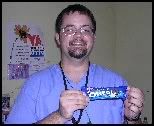
Wednesday afternoon, Tito went down the street to a store and came back with treats for everyone. He gave me two little 4-packs of Oreos, one of my all-time favorite cookies. I was so happy to have these little slices of home that I had a picture taken with one of them to commemorate the moment. I broke into the package and began devouring the cookies with glee. Then my glee turned to confusion. These Oreos did not taste like proper Oreos. They weren't stale or past their expiration or anything. They just didn’t taste like Oreos are supposed to taste. It’s like they were cheap Oreo knock-offs that looked exactly like Oreos, down to the lettering on the wafers, but they did not copy the taste at all. It’s not that they even tasted bad. As far as cookies go, they were okay. But they were definitely not Oreos. I gave my other pack to Ashley, who had a bite of one cookie and then gave them all back to me.
This is just one example of how some products sold both in Central and North America may have the same brand name but taste radically different. Another prime example is Fresca Cola. In America, Fresca is now a diet drink, with no calories or carbohydrates. It has kind of a citrusy grape-fruity thing going, but is nothing to write home about. In Central America, Fresca is a full-sugar soda that’s bursting with citrus flavor. Ashley spoke highly of it when she came back in 2003 and was itching to get hold of some while she was in Central America for this trip. Fortunately, Fresca practically flowed like rivers wherever we went and the mission teams of both Guatemala and El Salvador had plenty on hand. The strange thing is, Coca Cola, the manufacturer of Fresca in both regions, used to sell regular Fresca in the states as well as a diet version of the same. Over the past couple of decades, however, the regular drink vanished and the diet drink took its name in some kind of unholy cola coup. These are the kind of odd little things I tend to remember.
Mid-way through the afternoon, Butch set his gecko free. He let it go in the hallway of the preschool and it scampered over near the wall and just sat there. I was afraid the poor little guy might get squished or gobbled up by a dog, as this was a very high human and dog traffic area. He didn’t want to move on his own, though. I finally had to walk very close to him, practically nudging him with my toes at every step, until he finally ran out the front door and climbed up the tree. Godspeed, Mr. Gecko.
As evening approached, we still had loads and loads of patients. Usually, the queue of folks who are still waiting to come inside to wait ends by 5 p, but we still had plenty of patients-to-be out front at 7:30. By 8 I had become concerned that patients who hadn’t been seen might be turned away or told to come back first thing in the morning, or something. That seemed like a possibility, though it was fortunately not one every brought up. I was against sending anyone away. We’d given out these patient tickets and as late as it was putting us, I still believed we had a responsibility to see every last patient we’d invited in. They’d all been very patient with us and were waiting just as long to be seen as we were to see them. In retrospect, I shouldn’t have been at all concerned that we wouldn’t see everyone, because there seemed to be no other options on the table anyway. Everyone else at the clinic was just as determined that every last patient we’d promised to see would be seen. And they were.
Creepy cicada boy returned that night. I had thought him to be the child of a patient, or a patient himself, the day before, but it turned out he was the son of the school’s administrator. Once again he picked up a good-sized fistful of cicadas and walked around with them making everyone nervous.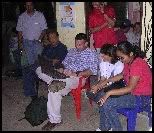 As the night descended, I took note of all the members of the mission team who no longer had assigned duties to perform. Much of the translation and missionary staff were finished with their part of the day, yet they still stayed til the bitter end in case we needed help. Butch helped keep them entertained with more funny little video clips from his laptop.
As the night descended, I took note of all the members of the mission team who no longer had assigned duties to perform. Much of the translation and missionary staff were finished with their part of the day, yet they still stayed til the bitter end in case we needed help. Butch helped keep them entertained with more funny little video clips from his laptop.
We didn’t wrap things up until after 9p that evening, but all patients were seen.
We had a late dinner back at the Word of Life offices. It felt so good to be able to sit down and relax a bit. The whole team, mission, translation, medical and staff, all sat and watched more of Butch’s slide show. This time we had pictures from the first day at the clinic. I loved seeing the faces of the patients as they were being treated. I got to see most of the faces when they came by the pharmacy window, but we were so often in a hurry to fill prescriptions that it’s difficult to pay attention all the time.
During dinner, Dr. Allen asked us how things were going in the pharmacy. Mary Ann told him I spent most of the day saying “Porque, porque, porque?!” because all the doses kept coming in for 30 pills when we’d so neatly pre-counted them into amounts of 20.
“Oh, that doesn’t matter,” Dr. Allen said. “Just give them the 20 count. We screwed that up on our end.”
Aye yi yi!
EL SALVADOR CLINIC DAY 2 STATS
Patients Seen: 224
Prescriptions Filled: 565
Salvations/Rededications: 76
DATELINE: Tuesday, March 29, 2005
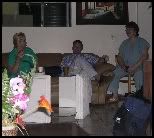 Ashley and I woke at 6:30 and quickly got dressed to meet everyone else downstairs by 7. Butch and Andrew were there already, but soon the rest of the team came down to join us.
Ashley and I woke at 6:30 and quickly got dressed to meet everyone else downstairs by 7. Butch and Andrew were there already, but soon the rest of the team came down to join us.We found that ordering breakfast was more difficult than we had anticipated. Actually, the ordering wasn’t really a major problem, as we just pointed to the continental breakfast on the menu and the waitress nodded her understanding, so even the language barrier wasn’t an issue. Getting the food in a timely fashion, however, was. I guess it’s another incident of Gringo Time expectations, but 20 minutes crawled by and we’d seen no food.
While we waited, I used the hotel’s complementary high speed internet access to jot a few notes to folks back home to let them know we’d arrived safely, albeit not without some life-threatening incidents.
It was 7:20 before we received our continental breakfast, bowls of nice fresh fruit. I think we had somehow been expecting muffins and jelly, or something similar. However, we would learn the following day that the continental breakfast changed every day, so whenever we ordered it we would get something different every time. The fruit was great stuff, but not as filling as we’d hoped to get to start us on what was to be a busy day.
Jo Ann and Sylvana arrived right on time at 7:30, with Sylvana’s van and Tito’s truck, once again piled high with all of our supplies luggage as well as a large set of metal shelves just perfect for the pharmacy. We climbed back into Sylvana’s van and then had to hold on for dear life as she zipped into San Salvador’s morning rush hour with a recklessness that Marcello would have greatly admired. We didn’t care. We didn’t even put on our seatbelts, figuring that she knew what she was doing and we were otherwise on a mission from God so we’d be fine.
My impression from the previous night that San Salvador was nearly indistinguishable from most large American cities continued to bear itself out. Mostly. In the day light, of course, we could see more of the tell-tale signs of being in a central American country, such as more guards with shotguns. However, the guards with shotguns seemed to be primarily guarding things like banks and other important structures and not so much average places like McDonalds. There were lots of people riding bicycles and motorcycles, seemingly on their way to work in this busy urban sprawl.
We had been told that our clinic site would be in a very poor neighborhood in San Salvador and that we would be setting up in a school. Being some distance away and our van being in heavy traffic, it took around a half hour to drive there. During the journey, I kept hearing a curious buzzing noise from outside the van. It didn’t sound like a sound being made by the van, though. Instead, it sounded exactly like the buzzing of cicadas—a sound I knew well from having grown up in Mississippi.
Eventually, we left the city streets and began traveling through a more residential section of town where the homes began to resemble some of those we had seen in Pasaco. Then, in the midst of the neighborhood, we came to a large new building surrounded by chain-link fencing topped with razor-wire. At first I thought this must be the school, but then we drove past it. I was told later that this building was a brand new neighborhood medical clinic. It was so new, in fact, that they were having their dedication ceremony the following day. It made me wonder what good we could do in the neighborhood if there was already such a nice looking clinic. Later, Jo Ann told us that even though the neighborhood clinic is there, completed and soon to be dedicated, they don’t actually have any doctors or medication and aren’t expected to actually open at any point in the foreseeable future. Strange. It's as if they had just enough money to build the building, but not enough to actually staff it and supply it.
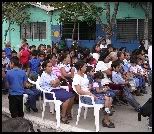 At last we arrived at our own clinic site. It was a cluster of three small brightly painted buildings that comprised the grounds of a pre-school that was located next door to a beautiful church. Outside of it were dozens of people, most of them seated in plastic patio chairs.
At last we arrived at our own clinic site. It was a cluster of three small brightly painted buildings that comprised the grounds of a pre-school that was located next door to a beautiful church. Outside of it were dozens of people, most of them seated in plastic patio chairs.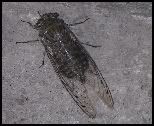 The other thing I noticed as I exited the van was the distinct buzzing of insects in the trees above—particularly in the tree directly outside the building. Yep, I had been right; they were cicadas. But not just any cicadas, no these were gigantic monster cicadas that would have terrified the wussy little Mississippi cicadas I grew up with. Their collective buzzing was practically a roar.
The other thing I noticed as I exited the van was the distinct buzzing of insects in the trees above—particularly in the tree directly outside the building. Yep, I had been right; they were cicadas. But not just any cicadas, no these were gigantic monster cicadas that would have terrified the wussy little Mississippi cicadas I grew up with. Their collective buzzing was practically a roar.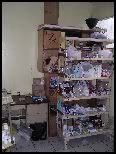 We quickly unloaded our equipment and luggage and carried it into the cluster of buildings. There were only a handful of rooms in the pre-school’s complex of small buildings, divided by an open air corridor that lead down to an equally open air common area. Mary Ann and I were directed to first doorway, which was the administrative office of the pre-school. This is where we were to set up our pharmacy. Soon our new shelves were brought in and placed inside the office. I also found a couple of small school tables which I once again stacked atop one another to create even more shelving. Mary Ann and I then began unloading and organizing the meds. Once again, this was a chaotic process, because we had not been as careful as we should have been when packing things back up at Marcello’s house following our luggage consolidation attempt. However, we were so old hat at organizing the disorganized by this point that it didn’t really bother us too much.
We quickly unloaded our equipment and luggage and carried it into the cluster of buildings. There were only a handful of rooms in the pre-school’s complex of small buildings, divided by an open air corridor that lead down to an equally open air common area. Mary Ann and I were directed to first doorway, which was the administrative office of the pre-school. This is where we were to set up our pharmacy. Soon our new shelves were brought in and placed inside the office. I also found a couple of small school tables which I once again stacked atop one another to create even more shelving. Mary Ann and I then began unloading and organizing the meds. Once again, this was a chaotic process, because we had not been as careful as we should have been when packing things back up at Marcello’s house following our luggage consolidation attempt. However, we were so old hat at organizing the disorganized by this point that it didn’t really bother us too much.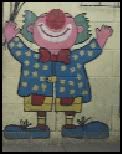 Meanwhile Ashley, Dr. Allen and Andrew set up in the large room across the corridor which they were to share. Flo, our appointed pediatrician med-student, set up in the rear building of the complex. We also got to meet many of the missionary and translator staff we would be working with during the week’s clinics. Jo Ann told us that she would be providing translation services for the pharmacy.
Meanwhile Ashley, Dr. Allen and Andrew set up in the large room across the corridor which they were to share. Flo, our appointed pediatrician med-student, set up in the rear building of the complex. We also got to meet many of the missionary and translator staff we would be working with during the week’s clinics. Jo Ann told us that she would be providing translation services for the pharmacy.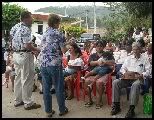 Soon it was time to go out front for introductions to our patients for the day. Even with a public address system set up, it was hard to hear over the din of the cicadas. There were only 40 patients at the beginning of the day. I believe we were prepared to give out at least 60 number tickets for the day, but the other 20 did go to use throughout the day as more patients arrived.
Soon it was time to go out front for introductions to our patients for the day. Even with a public address system set up, it was hard to hear over the din of the cicadas. There were only 40 patients at the beginning of the day. I believe we were prepared to give out at least 60 number tickets for the day, but the other 20 did go to use throughout the day as more patients arrived.After introductions, Dr. Allen shared his testimony while the rest of us returned to setting up our stations. He had shared it with at least one of the patient groups in Guatemala, but I had not been there to hear it that day because of pharmacy set up. However, because our pharmacy was there at the front of the building with open windows, I could hear it. I don’t think he would mind me sharing it here.
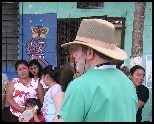 Dr. Allen took a very long road to on his way to Christianity. He spent much of his early adult life as a secular humanist. Both he and Mary Ann had been married and divorced from other people before meeting one another, marrying and starting a family. Of the two of them only Mary Ann was a Christian, but as she had been raised under a strict Catholic doctrine she was under the belief that because she had divorced she was now damned to hell. Even in the face of that, she wanted to take her children to church and began attending services in a local protestant church. She would occasionally ask Dr. Allen to go with them, but he was deadest against it and would become angry with her when she asked. He said that at one point things in their marriage had become do bad that he had threatened to divorce her if she ever asked him to church again. Somehow, though, she did manage to persuade him to go in because the minister at her church had said he wanted to meet Dr. Allen. Dr. Allen went with the full intention of telling this man off. However, instead of a fight Dr. Allen he found that he actually liked the minister and the two soon became friends. It was not long afterwards that the spirit moved in Dr. Allen’s heart and he came to recognize the need for God in his life. He accepted Christ and joined the church there and he and Mary Allen have been strong marriage partners ever since.
Dr. Allen took a very long road to on his way to Christianity. He spent much of his early adult life as a secular humanist. Both he and Mary Ann had been married and divorced from other people before meeting one another, marrying and starting a family. Of the two of them only Mary Ann was a Christian, but as she had been raised under a strict Catholic doctrine she was under the belief that because she had divorced she was now damned to hell. Even in the face of that, she wanted to take her children to church and began attending services in a local protestant church. She would occasionally ask Dr. Allen to go with them, but he was deadest against it and would become angry with her when she asked. He said that at one point things in their marriage had become do bad that he had threatened to divorce her if she ever asked him to church again. Somehow, though, she did manage to persuade him to go in because the minister at her church had said he wanted to meet Dr. Allen. Dr. Allen went with the full intention of telling this man off. However, instead of a fight Dr. Allen he found that he actually liked the minister and the two soon became friends. It was not long afterwards that the spirit moved in Dr. Allen’s heart and he came to recognize the need for God in his life. He accepted Christ and joined the church there and he and Mary Allen have been strong marriage partners ever since.Hearing his testimony blew me away, because you would never suspect to know Dr. Allen that he was anything other than a life-long Christian. Granted, I don't know him very well myself, having only met him a few weeks before this trip. But from what Ashley has told me about him, from having worked with him and Mary Ann for four months worth of rotations, he is a very caring and compassionate doctor who wears his Christianity proudly with his patients. He's not afraid to pray for them and with them in the course of his work. It's a testimate to the life-altering power of Christ's love that this man who once hated religion has come to know God so strongly.
Dr. Allen has only been on a handful of mission trips so far. I believe that when Ashley did her first medical rotation with his office, she learned of his interest in the mission field and had reccomended Word of Life's program. He liked the sound of it so much that he and Mary Ann went with them on last year’s trip and plan to continue going with WOL and other groups in the future.
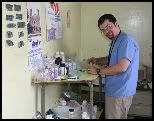 Soon our first El Salvador clinic was underway and our pharmacy almost completely set up. One thing that confused and concerned Mary Ann and I, however, was the fact that a goodly portion of our meds had seemingly vanished.
Soon our first El Salvador clinic was underway and our pharmacy almost completely set up. One thing that confused and concerned Mary Ann and I, however, was the fact that a goodly portion of our meds had seemingly vanished.See, before at our clinic in Pasaco, Guatemala, Marcello had brought us several boxes of donated Spanish-label medicines to help replenish some of our dwindling stocks. It had taken Mary Ann the better part of an hour with Dr. Allen's Epocrates equipped PDA to figure out what most of those medicines were and relabel them so that we could begin prescribing them to patients. However, by the time we’d figured them all out our final Guatemalan clinic was nearly finished, so we had just loaded them all back on the bus and taken them back to camp, intending to carry the meds on to El Salvador. From what we then deduced, though, we had managed to leave the boxes of Spanish medication back on the big school bus and they had never been unloaded with the rest of the meds we’d had at Marcello’s house. We were also missing a few other non-critical supplies, which we had to assume were left behind on the bus as well. It would have been nice to have everything we'd intended to bring, but our mistake in leaving it behind wasn't the end of the world. After all, Marcello would host other medical missions in the year and those meds would eventually go to good use.
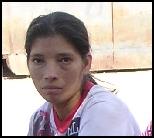 The clinic setup in the preschool in San Salvador was quite ideal to our purposes. The patients waited in the chairs out front until it was their turn to speak with the missionaries. (Unfortunately, the only shade we could give them was beneath the cicada-filled tree. As you'll see later in this day's post, this was not necessarily a good thing.) They were then invited across the street to some other small buildings the local Word of Life staff had arranged to use for the actual mission outreach.
The clinic setup in the preschool in San Salvador was quite ideal to our purposes. The patients waited in the chairs out front until it was their turn to speak with the missionaries. (Unfortunately, the only shade we could give them was beneath the cicada-filled tree. As you'll see later in this day's post, this was not necessarily a good thing.) They were then invited across the street to some other small buildings the local Word of Life staff had arranged to use for the actual mission outreach.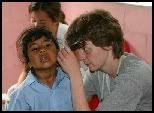 After they were finished there, the patients came back across and waited once again in front of the building until there was space for them in the open-air common area toward the back of the school. Then they would be seen be the first available doctor, depending on their needs. (For instance, if they were children, they went right to Flo’s station, while adults went to Dr. Allen, Ashley or Andrew.) We unfortunately had no dental team on this mission, but dental problems didn’t seem to come up in El Salvador nearly as much as in Guatemala.)
After they were finished there, the patients came back across and waited once again in front of the building until there was space for them in the open-air common area toward the back of the school. Then they would be seen be the first available doctor, depending on their needs. (For instance, if they were children, they went right to Flo’s station, while adults went to Dr. Allen, Ashley or Andrew.) We unfortunately had no dental team on this mission, but dental problems didn’t seem to come up in El Salvador nearly as much as in Guatemala.)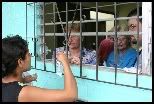 After being examined and treated, the patients brought their prescription forms around to the front window of the building where they handed them through for us to fill. Like I said, it was pretty ideal. And the weather was fantastic. We had been told by our friends in Guatemala that the weather in El Salvador was going to be even hotter than it had been during our first week. God was evidently smiling down on us that week because the temperatures rarely pushed much past 90. It was still definitely warm, but not nearly as humid as we had expected. Jo Ann stressed that the weather was abnormally cool for this time of year and that she too was rather amazed about it because they had not expected such good temperatures.
After being examined and treated, the patients brought their prescription forms around to the front window of the building where they handed them through for us to fill. Like I said, it was pretty ideal. And the weather was fantastic. We had been told by our friends in Guatemala that the weather in El Salvador was going to be even hotter than it had been during our first week. God was evidently smiling down on us that week because the temperatures rarely pushed much past 90. It was still definitely warm, but not nearly as humid as we had expected. Jo Ann stressed that the weather was abnormally cool for this time of year and that she too was rather amazed about it because they had not expected such good temperatures. While we had taken over much of the school itself, the school was still very much in operation. The kids had just been relocated to one of the larger rooms that we weren’t occupying and they mostly stayed in there, coming out to play in the play yard on occasion, usually when there weren’t too many patients around. The school’s administrator/teacher was also on hand. I think she was probably annoyed that we had taken over her office, but was very accommodating, even when she had to come in and rummage through her desk for things. Another employee was the school’s cook and she spent much of her time in the kitchen area just one room down from us, preparing some of the best-smelling foods.
While we had taken over much of the school itself, the school was still very much in operation. The kids had just been relocated to one of the larger rooms that we weren’t occupying and they mostly stayed in there, coming out to play in the play yard on occasion, usually when there weren’t too many patients around. The school’s administrator/teacher was also on hand. I think she was probably annoyed that we had taken over her office, but was very accommodating, even when she had to come in and rummage through her desk for things. Another employee was the school’s cook and she spent much of her time in the kitchen area just one room down from us, preparing some of the best-smelling foods.While I was still popping Cipros down three times a day, my stomach wasn’t quite as strong as I usually prefer. Naturally, I had to use the bano at one point and went off to find it. The banos for the school were located toward the rear of the facility behind two brown metal doors. Inside the stalls were toilets that did not come equipped with toilet seats. This made things a bit tricky, but the rooms were very clean, as were the toilets themselves and the waste baskets beside them, so I didn’t worry too much. However, when it came time to flush, I was horrified that the flush handle did nothing at all. I was afraid that I must have used the broken toilet and was embarrassed that we might have to live with my byproducts for much of the day. The school’s cook saw my distressed expression and signaled to me to pay attention. Outside the banos, there in the outdoor common area of the school, were two large concrete sinks filled with probably a dozen gallons of water each. As I watched the woman picked up one of the large plastic basins that rested on the sides of one of the sinks, dipped them into the water and pantomimed pouring it out as she pointed to the bano room I’d just come from. Ah ha! So I filled a basin, took it in there and poured it into the bowl of my toilet and everything flushed just fine.
While I’m pretty sure most of the buildings in the area did have running water, the concrete sinks and similar ones like it in the neighborhood did seem to serve as a water source for some neighborhood homes that did not have running water. Throughout the morning we saw ladies walking down the street carrying tall plastic jugs of water on their heads, coming to and from a water source further down the road. Some of the water jugs had advertising on them.
We talked with Jo Ann during some of the down time that morning. Though she’s been a resident of both South and Central America for over 20 years, she originally came from New Jersey. She had lived in Argentina and Chile for much of her time, but had spent the last several years in El Salvador helping to set up the Word of Life ministry with Tito and their son.
Jo Ann seemed impressed with how quickly and efficiently we took to our jobs. She even said my Spanish dosing instructions sounded quite authentic and asked if I spoke Spanish fluently.
“No,” I said, in perfect Spanish.
We broke for lunch around noon. We didn’t have enough staff to justify taking lunch in shifts, so we just locked up the clinic and headed to a building next door that was equipped with a large conference room. There we received our catered meal prepared by longtime friends of the Word of Life El Salvador team. We had delicious sandwiches during our lunches this week and every day these sandwiches came with some of the best potato chips I’ve ever eaten. These were home made potato chips, thick cut and deep fried to a crisp. They were fantastic, particularly with mayonnaise. And there was always extra food at the end if we wanted seconds. Beyond a few pangs of guilt about being so spoiled in a country where so many of the neighbors had so little, I enjoyed our lunch time meals. It was also a great time to get to know some of the other missionaries and translation staff members. Just as in Guatemala, most of them were university and highschool-aged students who were fluent in English.
 One non-appetizing aspect of going to and from lunch was having to walk underneath the tree in front of the building. This is because there was a near-constant stream of cicada urine raining down from the tree. Maybe it was cicada spit, but I doubt it. It was very disgusting to keep feeling drops of it hit you, knowing full well what it was. We took to walking a wide path around the tree whenever we could, but because the tree’s limbs stretched over the open corridor and play area of the pre-school complex, we could never completely avoid getting wet. We were all glad we had plenty of hand-sanitizer.
One non-appetizing aspect of going to and from lunch was having to walk underneath the tree in front of the building. This is because there was a near-constant stream of cicada urine raining down from the tree. Maybe it was cicada spit, but I doubt it. It was very disgusting to keep feeling drops of it hit you, knowing full well what it was. We took to walking a wide path around the tree whenever we could, but because the tree’s limbs stretched over the open corridor and play area of the pre-school complex, we could never completely avoid getting wet. We were all glad we had plenty of hand-sanitizer.After lunch, we returned to the clinic where we found we had far more patients waiting than we’d had before lunch. More number tickets were issued and we started right in. Fortunately, the medical team was joined then by an El Salvadorian doctor named Dr. Grace. Dr. Grace was awesome to work with, not only for her bright demeanor and quick wit but also because she spoke fluent English as well as Spanish, which made working out any prescription translation problems much easier on us. The only real downside to Dr. Grace’s presence is that because she spoke Spanish as her native language she was able to see many more patients than any of the other doctors, creating that much more work for the pharmacy. We found ourselves completely swamped in patients waiting for their prescriptions and we had to hop quick to keep up with the demand.
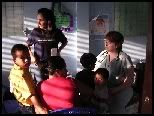 Our patients mostly consisted of partial families, with a mom bringing in her kids for treatment. Sometimes aunts would bring nieces and nephews. Sometimes grandparents would bring in grand kids. It varied quite a bit. We didn’t have a tremendous amount of male patients, but when we did they were usually elderly.
Our patients mostly consisted of partial families, with a mom bringing in her kids for treatment. Sometimes aunts would bring nieces and nephews. Sometimes grandparents would bring in grand kids. It varied quite a bit. We didn’t have a tremendous amount of male patients, but when we did they were usually elderly.One younger man we did treat was a guy we came to learn was the area’s town drunk. He was quite sloshed already when he arrived at the clinic, late in the morning after all the morning’s number tickets had been passed out. The missionaries told him to come back in the afternoon when we would give out more tickets, but the man just hung around asking anyone who got near him to have a look at his thumb. He even came up to the pharmacy on several occasions trying to get me to have a look at his thumb. Now, in his defense, I was wearing a scrub shirt, so I guess I sort of looked like a doc. (I’d avoided wearing scrubs in Guatemala for this very reason, but then I tried one on and found out the shirts are quite cool and comfy, so I wore it anyway.) I, with Jo Ann translating, told the man that I was not a doctor and invited him to come back later when a real doctor could treat him. Still he persisted and kept showing me his blackened thumbnail. Some of the locals who were in line at the pharmacy told us the man’s story and advised us to just ignore him. But after lunch, I made it a point to make sure this man got a ticket to be treated. Just because he was a little obnoxious and drunk didn’t mean he wasn’t hurting and I’d let a doctor determine just how bad off the guy’s thumb was.
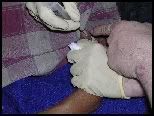 Soon he was officially in line and proceeded through the system until he came to Dr. Allen’s station. Dr. Allen said the thumbnail was filled with blood from some previous injury and it needed to be drained out. Dr. Allen had the fellow lay on one of the tables and then called Andrew over to do the surgery. Andrew proceeded to use a heated implement to bore a hole through the man’s nail and they began the drainage using a siringe. Everyone gathered around to watch and squirm at the uncomfortable sight, and I’m pretty sure Butch got video of it all. The patient never uttered a peep during it, but then again I think he was pretty-well self-anesthetized.
Soon he was officially in line and proceeded through the system until he came to Dr. Allen’s station. Dr. Allen said the thumbnail was filled with blood from some previous injury and it needed to be drained out. Dr. Allen had the fellow lay on one of the tables and then called Andrew over to do the surgery. Andrew proceeded to use a heated implement to bore a hole through the man’s nail and they began the drainage using a siringe. Everyone gathered around to watch and squirm at the uncomfortable sight, and I’m pretty sure Butch got video of it all. The patient never uttered a peep during it, but then again I think he was pretty-well self-anesthetized.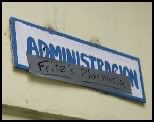 During what little down time Dr. Grace’s efficiency allowed us, I put up a new pharmacy sign. One of the real pharmacists from West Virginia who usually comes on these Word of Life missions is a guy named Fritz. He runs an establishment called Fritz’s Pharmacy back home. (And even if Ashley didn’t know the man personally, I would have known this because we get about one call per month at our house from customers of Fritz’s Pharmacy who assume that because our last name is Fritzius we must somehow be Fritz. We always explain that we are not Fritz, to which the customers almost always reply, “Well, do you know Fritz’s number?”) Unfortunately, this is the first year in the past three that Fritz was unable to come on the trip, but he did help provide us with very cheap medications to take with us. So cheap, in fact, that he bought quite a bit of them himself and wouldn’t allow us to reimburse him from funds, grants and donations that our WV team had already raised. Granted, he was getting these meds at cost, but this still represented several thousand dollars worth of pharmaceuticals that we would otherwise have been without. I dare say the vast majority of the meds we had on hand came from Fritz’s donation. In his honor, I made up two simple duct-tape signs that read “Fritz’s Pharmacia” and taped them up at our window and above our door. (I later learned that in Spanish the word is actually spelled “Farmacia” but it worked just as well.)
During what little down time Dr. Grace’s efficiency allowed us, I put up a new pharmacy sign. One of the real pharmacists from West Virginia who usually comes on these Word of Life missions is a guy named Fritz. He runs an establishment called Fritz’s Pharmacy back home. (And even if Ashley didn’t know the man personally, I would have known this because we get about one call per month at our house from customers of Fritz’s Pharmacy who assume that because our last name is Fritzius we must somehow be Fritz. We always explain that we are not Fritz, to which the customers almost always reply, “Well, do you know Fritz’s number?”) Unfortunately, this is the first year in the past three that Fritz was unable to come on the trip, but he did help provide us with very cheap medications to take with us. So cheap, in fact, that he bought quite a bit of them himself and wouldn’t allow us to reimburse him from funds, grants and donations that our WV team had already raised. Granted, he was getting these meds at cost, but this still represented several thousand dollars worth of pharmaceuticals that we would otherwise have been without. I dare say the vast majority of the meds we had on hand came from Fritz’s donation. In his honor, I made up two simple duct-tape signs that read “Fritz’s Pharmacia” and taped them up at our window and above our door. (I later learned that in Spanish the word is actually spelled “Farmacia” but it worked just as well.)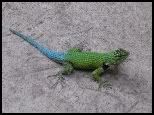
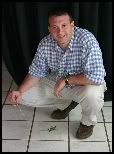 Sometime during the afternoon, Butch found a gecko. It was a bright green lizardy little thing, with patches of blue. Butch captured him in a Tupperware bowl and held him for safe-keeping and observation, tossing in a few bugs and some water to keep the little guy fed and watered. We suggested that he toss in a cicada, but we frankly weren’t sure which one would win that fight. Butch was proud of his gecko. He tied a little string leash around him and posed for pictures.
Sometime during the afternoon, Butch found a gecko. It was a bright green lizardy little thing, with patches of blue. Butch captured him in a Tupperware bowl and held him for safe-keeping and observation, tossing in a few bugs and some water to keep the little guy fed and watered. We suggested that he toss in a cicada, but we frankly weren’t sure which one would win that fight. Butch was proud of his gecko. He tied a little string leash around him and posed for pictures.Speaking of cicadas, as the afternoon progressed into early evening, the cicadas buzzing grew much louder and they began to leave the confines of the tree. Once the sun had set and we began to turn on interior lights in the clinic buildings, the cicadas took to flying in and buzzing loudly around the lights and falling on us. I didn’t care so much, as I don’t really find the cicadas themselves disgusting. However, Mary Ann was in constant fear of cicada attack and would squeal every time one would buzz through. No one wanted to squish the things, because as big as they were it would be a huge mess to have to clean up. So I wound up having to pick several of them up and fling them out the front door. The cicadas didn’t seem to care. In fact, there was a little boy at the school who went around picking up as many cicadas as he could find until he had a huge buzzing ball of them between his hands. This he carried around, causing us some concern that he might get it in his head to walk into one of the clinic rooms and fling his cicada cargo into the air. Fortunately, he didn’t.
By the end of the day, we had decided that the clinic site was so perfect that we would just do all of our week’s clinics there. Our only problem was that we were running out of some of our medications. I began compiling a list of the things we were out of or nearly out of: Children’s Benadryl, cough syrup, Amoxil liquid, Hydrocortizone cream, fungicidal creams, Triamcynalone and Nystatin cream. I hoped we could swing by a real pharmacy in the morning and pick some up. And despite our joy at having our Enfamil returned to us just days before, we had yet to use any of it. There just wasn’t a lot of need for it. It seemed an awful shame to have spent so much for it and had so much trouble getting it here and not having any use for it.
We wrapped up our day’s clinic around 7:30, let the school administrator lock up the building and then climbed into Sylvana’s van to head out. We drove 35 minutes or so back through San Salvador until we reached the Word of Life staff offices, located not terribly far from where Tito and Jo Ann’s home not to mention our hotel. The office was in a residential neighborhood and was probably used as a home itself in the past. There we, and the mission and translation staff, all gathered for our evening devotional and meal. We dined on delicious lasagna and salad provided by the same caterers from lunch. Butch had compiled a slide show of the last two days worth of pictures from Guatemala to show the El Salvador staff. I still found that my emotions were very close to the surface about some of our experiences in Guatemala. Even the pictures of the patients from our final clinic day in Pasaco not to mention all the beauty we’d seen in Antigua caused me to tear up all over again. They weren’t the heart-broken tears I’d shed after our first clinic in Guatemala, but were a good release all the same.
We said goodnight and returned to the comfort of our hotel.
In addition to wonderful air-conditioning and cool tile showers, our room also had a balcony that overlooked the street below and had a nice view of San Salvador itself. Ashley and I enjoyed standing out there and peering out in silence, marveling at where we were and what we were there to do. This was truly the kind of quick-paced trip where you had to stop and take a look around once in a while.
EL SALVADOR CLINIC DAY 1 STATS
Patients Seen: 197
Prescriptions Filled: 409
Salvations/Rededications: 75
